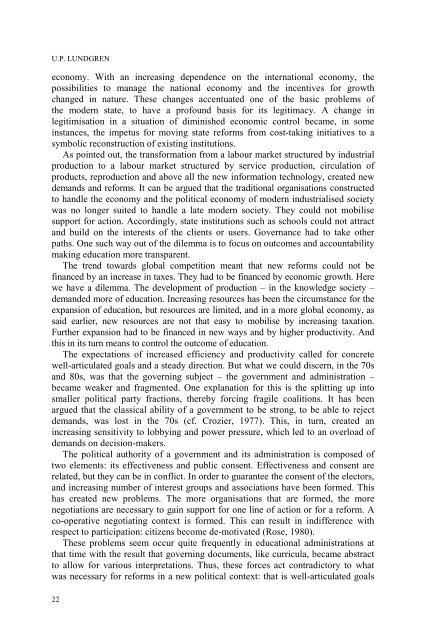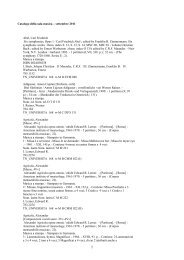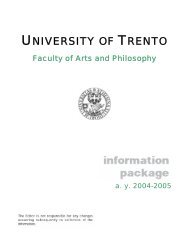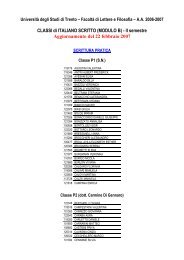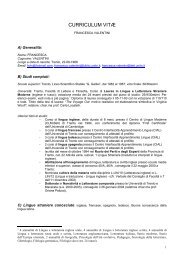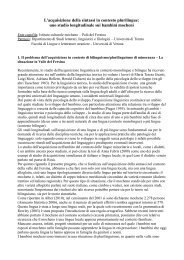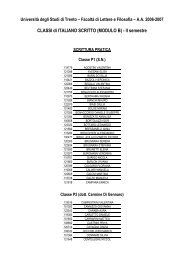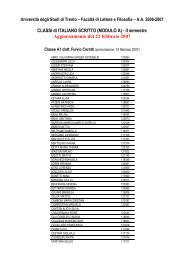PISA Under Examination - Comparative Education Society in ...
PISA Under Examination - Comparative Education Society in ...
PISA Under Examination - Comparative Education Society in ...
Create successful ePaper yourself
Turn your PDF publications into a flip-book with our unique Google optimized e-Paper software.
U.P. LUNDGREN<br />
economy. With an <strong>in</strong>creas<strong>in</strong>g dependence on the <strong>in</strong>ternational economy, the<br />
possibilities to manage the national economy and the <strong>in</strong>centives for growth<br />
changed <strong>in</strong> nature. These changes accentuated one of the basic problems of<br />
the modern state, to have a profound basis for its legitimacy. A change <strong>in</strong><br />
legitimisation <strong>in</strong> a situation of dim<strong>in</strong>ished economic control became, <strong>in</strong> some<br />
<strong>in</strong>stances, the impetus for mov<strong>in</strong>g state reforms from cost-tak<strong>in</strong>g <strong>in</strong>itiatives to a<br />
symbolic reconstruction of exist<strong>in</strong>g <strong>in</strong>stitutions.<br />
As po<strong>in</strong>ted out, the transformation from a labour market structured by <strong>in</strong>dustrial<br />
production to a labour market structured by service production, circulation of<br />
products, reproduction and above all the new <strong>in</strong>formation technology, created new<br />
demands and reforms. It can be argued that the traditional organisations constructed<br />
to handle the economy and the political economy of modern <strong>in</strong>dustrialised society<br />
was no longer suited to handle a late modern society. They could not mobilise<br />
support for action. Accord<strong>in</strong>gly, state <strong>in</strong>stitutions such as schools could not attract<br />
and build on the <strong>in</strong>terests of the clients or users. Governance had to take other<br />
paths. One such way out of the dilemma is to focus on outcomes and accountability<br />
mak<strong>in</strong>g education more transparent.<br />
The trend towards global competition meant that new reforms could not be<br />
f<strong>in</strong>anced by an <strong>in</strong>crease <strong>in</strong> taxes. They had to be f<strong>in</strong>anced by economic growth. Here<br />
we have a dilemma. The development of production – <strong>in</strong> the knowledge society –<br />
demanded more of education. Increas<strong>in</strong>g resources has been the circumstance for the<br />
expansion of education, but resources are limited, and <strong>in</strong> a more global economy, as<br />
said earlier, new resources are not that easy to mobilise by <strong>in</strong>creas<strong>in</strong>g taxation.<br />
Further expansion had to be f<strong>in</strong>anced <strong>in</strong> new ways and by higher productivity. And<br />
this <strong>in</strong> its turn means to control the outcome of education.<br />
The expectations of <strong>in</strong>creased efficiency and productivity called for concrete<br />
well-articulated goals and a steady direction. But what we could discern, <strong>in</strong> the 70s<br />
and 80s, was that the govern<strong>in</strong>g subject – the government and adm<strong>in</strong>istration –<br />
became weaker and fragmented. One explanation for this is the splitt<strong>in</strong>g up <strong>in</strong>to<br />
smaller political party fractions, thereby forc<strong>in</strong>g fragile coalitions. It has been<br />
argued that the classical ability of a government to be strong, to be able to reject<br />
demands, was lost <strong>in</strong> the 70s (cf. Crozier, 1977). This, <strong>in</strong> turn, created an<br />
<strong>in</strong>creas<strong>in</strong>g sensitivity to lobby<strong>in</strong>g and power pressure, which led to an overload of<br />
demands on decision-makers.<br />
The political authority of a government and its adm<strong>in</strong>istration is composed of<br />
two elements: its effectiveness and public consent. Effectiveness and consent are<br />
related, but they can be <strong>in</strong> conflict. In order to guarantee the consent of the electors,<br />
and <strong>in</strong>creas<strong>in</strong>g number of <strong>in</strong>terest groups and associations have been formed. This<br />
has created new problems. The more organisations that are formed, the more<br />
negotiations are necessary to ga<strong>in</strong> support for one l<strong>in</strong>e of action or for a reform. A<br />
co-operative negotiat<strong>in</strong>g context is formed. This can result <strong>in</strong> <strong>in</strong>difference with<br />
respect to participation: citizens become de-motivated (Rose, 1980).<br />
These problems seem occur quite frequently <strong>in</strong> educational adm<strong>in</strong>istrations at<br />
that time with the result that govern<strong>in</strong>g documents, like curricula, became abstract<br />
to allow for various <strong>in</strong>terpretations. Thus, these forces act contradictory to what<br />
was necessary for reforms <strong>in</strong> a new political context: that is well-articulated goals<br />
22


